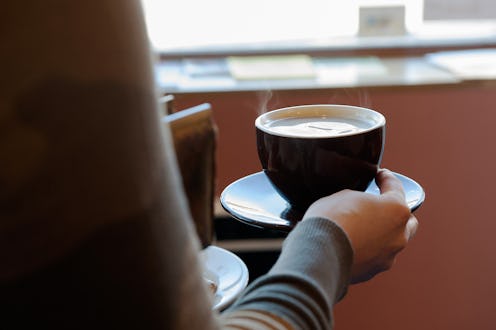Life
This Simple, Expert-Approved Trick Will Help You Cut Out Caffeine In Less Than A Week

Most of us can’t imagine getting out of bed or making it through our morning meetings without a kickstart from caffeine, whether in the form of coffee, tea, soda, or an energy drink. In fact, USA Today reported in 2013 that around 83 percent of Americans drink coffee, and many people consider caffeine the most popular drug in the U.S. Consuming caffeine, which is classified as a stimulant, on a regular basis does have some health benefits — including memory-boosting properties, helping with alertness, and it can improve your attention span. Some studies suggest regularly consuming caffeine may even help lower your risk of getting certain types of cancer and illnesses, according to the American Cancer Society. However, drinking too much caffeine, especially if you're sensitive to it, can negatively impact your health. If you don’t like how caffeine makes you feel, but don't know how to get it out of your life, there are ways to cut out caffeine without feeling awful.
“In excess, caffeine for those that are sensitive can result in side effects such as increased heart rate (no good for someone with hypertension), feelings of anxiety, insomnia, decreased desire for food, increased thirst and heartburn,” Maya Feller, a registered dietician, tells Bustle. “Reducing one's caffeine intake can ameliorate the aforementioned symptoms.”
Feller explains the best way to reduce your caffeine intake is by taking baby steps, and not to suddenly quit cold turkey. “Coming off caffeine is just like coming off any other drug. For some people they will feel the effects of caffeine in as little as 10 minutes, and like any drug, the body becomes accustomed to the feeling and eventually wants more. In order to not send the body into withdrawal — which is very uncomfortable— I would suggest a step down approach,” she says.
So, what exactly would a step down approach look like? Feller explains, “For two days, reduce 1/4 of your caffeinated beverage, and replace with a decaf beverage. For example, if you consume energy drinks, cut the serving size by ¼. Or, if you drink coffee, make a mixture of decaf and regular caf.” After that, Feller tells Bustle you can cut down your caffeine by fifty percent, and then, at day five, you should me able to make a smooth switch to a 75 percent reduction in your caffeine intake.
Furthermore, since drinking coffee is an essential part of a morning routine for many of us, Feller also suggests “maintaining the warm morning beverage ritual while modifying the caffeine content.” Or, for those who drink caffeinated soda or an energy drink, Feller says to try to drink something with a “similar mouth feel,” like a seltzer water. If you're an ice coffee baby, ask your barista for the decaf version of your favorite drink. Basically, trying to replicate your morning coffee (or bubbly drink) ritual will help ease any trouble you experience when transitioning to a caffeine-free life.
Though there are definitely health benefits to cutting out caffeine, it’s totally normal to feel some side effects if you are used to drinking a lot of it. “For some, the side effects of quitting coffee can range from mild to intense. They may experience depressed mood, anxiety, fatigue, and difficulty concentrating,” explains Feller. Not to mention, some people who quit caffeine report experiencing mild to severe headaches, which doesn't sound pleasant at all.
If you're freaking out about the potential withdrawal symptoms of cutting out your cup of joe, there are ways to make the switch to a caffeine-free lifestyle less grueling. “To ease the symptoms, stay well hydrated with caffeine free beverages. Also, be sure to have regular balanced meals that will help keep blood sugars level while nourishing you.” She adds that practicing good sleep hygiene and exercising to give you a boost of endorphins can also help alleviate some of the symptoms you can experience when you quit caffeine.
As far as quitting caffeine goes, slow and steady wins the race. If you are looking to lower your caffeine intake, or cut it out altogether, make sure you do so in a healthy way by reducing your intake little by little.